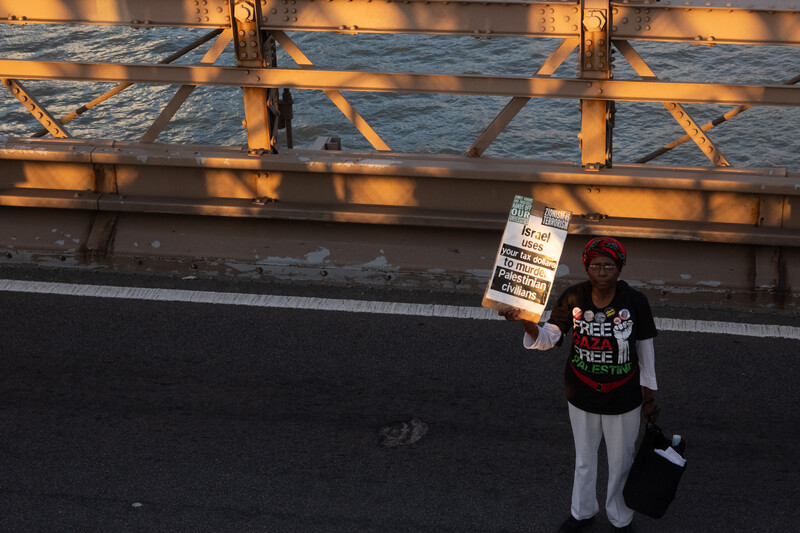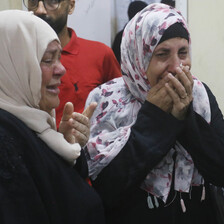The Electronic Intifada 23 November 2023

There is a concerted effort in the US to silence voices in support of Palestinians. Here a woman protests Israel’s crimes on Brooklyn Bridge in New York on 28 October.
ZUMAPRESSWe are jolted awake every morning by nightmares we hope are not real. Every morning, for over six weeks, we are hit with the realization that the actual nightmares are an extension of the unending nightmare in Gaza we are witnessing on the news. This nightmare is one we have been warned about, reminded about and are now living through.
The specter of the Nakba being repeated has been the backdrop to our decades-long efforts to write our history and tell our stories – via the literary and performing arts, as well as via multiple academic disciplines.
As Palestinians in the diaspora and those in solidarity, we watch in sheer disbelief as Gaza is struggling to survive – as Gazans are literally suffocating, starving, and dehydrating while being bombed to death.
The scale of the catastrophe is still unknown, as many are trapped under the rubble.
I keep wondering what people think when they hear that Gaza has had its water cut off. Do they understand what this means? Do they try, even for a fleeting moment, to picture what that would mean for themselves and their families?
To create such catastrophic conditions requires a level of disdain and depravity that no living being deserves, not even “animals,” which the Israelis deem as inferior. As we know all too well, it requires viewing Palestinians as savages, whose decimation is then justified.
A campaign of intimidation
Yet to point this out, to decry such inhumane treatment, will get you slandered with some of the worst imaginable epithets, including “anti-Semite” and “terrorist supporter.”
The campaign to silence those speaking up against Israel’s atrocities – which include violating the most basic protections required by international humanitarian law – is overwhelming and frightful.
For those of us in the diaspora, along with our supporters and allies, our response to the unfolding genocide in Gaza has largely been reactive: we oscillate between paralysis and scrambling to act. We oscillate between considering the risks to our safety and livelihoods, and asserting our presence in public spaces to raise our voices.
Raising our voices requires a calculation of risk: Will I be doxxed? Will I be slandered? Will I be prosecuted? Will I be suspended? Will I be fired? Will my job offer be rescinded? Will I be denied tenure? Will I be denied entry into Palestine?
When we sign petitions, write letters, or attend vigils, demonstrations, talks, and other local activities, we do so despite our fear. We look over our shoulders to ensure we aren’t being followed home. At events, we turn away or cover our faces to hide our identities from journalists’ cameras and the gaze of nefarious actors.
But fear also often silences us, making us appear as if we acquiesce to the maiming, orphaning and killing thousands of children in Gaza.
It is not safe to be Palestinian or pro-Palestinian, i.e., to merely state that Palestinians have a right to be free in the fullest sense of the term. Public displays of empathy or solidarity are met with swift punishment. The fear campaign reminds us that nowhere is safe. Even in the supposed safety of their own homes, Palestinians are under constant surveillance.
No safe place
But we know that safety and fear are relative. If you live in northern Gaza, you are bombed and told to flee to the south.
If you are on the so-called safe passage fleeing to southern Gaza, you are still not safe. If you are not getting bombed mid-journey, you are being bombed in the south – including in homes, hospitals and schools.
If you are at the Rafah crossing, trying to flee to Egypt, you are bombed.
Nowhere in Gaza is safe from Israel’s relentless bombing and there is nowhere to run. The catastrophic conditions engendered by Israel cutting off food, water, medicine, fuel and electricity are unimaginable and worse each day.
Israel also cut off Gaza’s final lifeline: its connection to the outside world (which has now been partially restored). The implications of this disconnection include being unable to communicate with ambulances, which were already being bombed.
In the face of such dire conditions, there is no choice but to speak up, indeed to shout. Shout in your little corner of the world, shout as loud as you can, shout the truth. As the late Edward Said demonstrated, we have an obligation to do so.
Stand tall
When truth is on your side, he told us, you have nothing to fear. Some of the loudest – and arguably the most effective – voices are those of anti-Zionist Jewish Americans who refuse to allow a genocide to be carried out in their name. These voices are getting louder as a critical mass forms and becomes increasingly fearless.
I hope we will all be fearless and encourage those around us to be the same. There are more people who see the truth and are fuming over the lies than we realize. Let us give our supporters the courage to show their faces, speak up en masse, and to hold accountable those who have mounted the campaign of fear. Let us overwhelm the efforts to silence us with lies.
Such collective speech will pass down the lessons of our history. As Jelani Cobb explains, “McCarthyism represented a cyclical phenomenon in American life … it’s a dynamic that has a particular kind of resilience in American life … there’s a question as to whether the spirit that animated … McCarthyism has ever really gone anywhere.”
When we exist in silos, we become victims of this cycle, intimidated, silenced and made invisible by fear. But we have the choice and power to flip the script. We can choose to speak despite our fear until our numbers swell, the fear dissipates, and the truth is revealed; truths that terrify those who hold on to power desperately and without conscience.
Stand taller, shout louder. Follow the moral compass that leads you toward an ever-growing global mass of conscientious people – multi-generational, multi-racial, multi-ethnic, and powerfully diverse – demanding justice for Palestinians and all Indigenous and marginalized people.
Janan Mousa is a Palestinian-American environmental scholar living on the colonized lands of Turtle Island.



Comments
Good to read coverage
Permalink Thomas Gallacher replied on
Good to read coverage entirely unlike western media which is completely biased in Israel's favour.